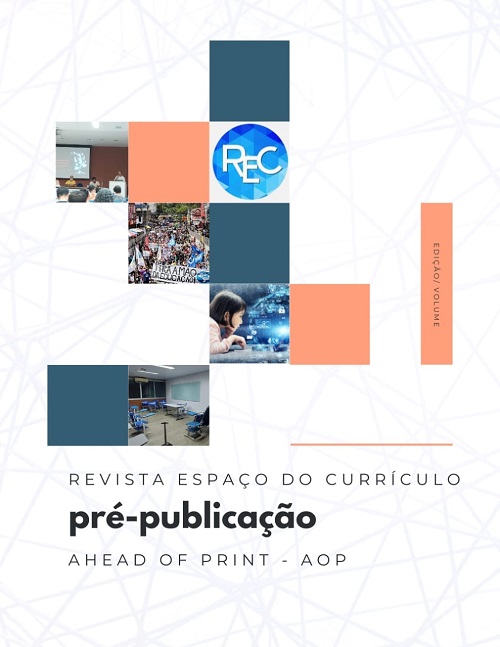LITERACY IN THE CONTEXT OF THE BNCC
an analysis in the light of Historical Cultural Theory
Keywords:
Literacy, Language, BNCC, Cultural Historical TheoryAbstract
The article aims to analyze, through the National Curricular Common Base, how Literacy is perceived in the context of the teaching and learning process, having as an analysis parameter, the theoretical and methodological assumptions of the Historical-Cultural Theory. Thus, the research methodology will be given through bibliographic and documentary research, having as reference authors that have as a presupposition the Cultural Historical Theory, such as: Vygotsky (2000), Leontiev (1978), Luria (1991), between others. At the end of the study it was found that the BNCC understands literacy as a training related to phonological awareness, thus implying a decontextualized, technical and reductionist view of the teaching and learning process.
Downloads
References
BRASLAVSKY, Berta. La escuela puede: una perspectiva didáctica. Buenos Aires: AIQUE Grupo Editor, 1992.
BRASIL. Ministério da Educação. Base Nacional Comum Curricular. MEC, Brasília, 2017.
COELHO, Sônia Maria. A Alfabetização na perspectiva histórico-cultural. Caderno de Formação: formação de professores didática dos conteúdos. Universidade Estadual Paulista. São Paulo: Cultura Acadêmica, 2011.
DUARTE, Newton. Vigotski e o “aprender a aprender”: crítica às apropriações neoliberais
e pós-modernas da teoria vigotskiana. Campinas, SP: Autores Associados, 2001.
GERALDI, João Wanderley. Linguagem e ensino: exercícios de militância e divulgação. Campinas: Mercado de Letras, 1991.
GIL, Antonio Carlos. Como elaborar projetos de pesquisa. São Paulo: Atlas, 2002.
LEONTIEV, A. N. O desenvolvimento do psiquismo. Tradução de Manuel Dias Duarte. Lisboa: Editora Livros Horizontes, 1978.
LURIA, Alexander Romanovich et al. O desenvolvimento da escrita na criança. In: VIGOTSKI, Lev Semenovich; LURIA, Alexander Romanovich; LEONTIEV, Alexis Nikolaevich. Linguagem, desenvolvimento e aprendizagem. Tradução de Maria da Penha Villalobos. 4. ed. São Paulo: Ícone, 1988.
LURIA, Alexander Romanovich. Curso de Psicologia Geral. Volume II. Tradução: Paulo Bezerra. Rio de Janeiro: Civilização Brasileira, 1991.
NOGUEIRA, Maria Alice. A escolha do estabelecimento de ensino pelas famílias: a ação discreta da riqueza cultural. Revista Brasileira de Educação. Jan/Fev/Mar/Abr 1998 nº 7 p. 42-56.
RIBEIRO, Vera Masagão. Problemas da abordagem piagetiana em educação: Emília Ferreiro e a alfabetização. 1991. 109f. Dissertação (Mestrado em Educação) – Pontifícia Universidade Católica, São Paulo. 1991.
RODRÍGUEZ, Cintia. O nascimento da inteligência: do ritmo ao símbolo. Porto Alegre: Artmed, 2004.
SAVIANI, Dermeval. Educação escolar, currículo e sociedade: o problema da Base Nacional Comum Curricular. Movimento-Revista de Educação, Rio de Janeiro, v. 3, n. 4, p. 54-84, jan./ago, 2016.
VIGOTSKI, Lev Semenovich. A formação social da mente. 4. ed. São Paulo: Fontes Editora Ltda, 1991.
VYGOTSKY, L. S. A formação social da mente. São Paulo: Martins Fontes, 2000.
VIGOTSKI, Lev Semenovich. Psicologia da arte. São Paulo: Martins Fontes, 2001.
Downloads
Published
How to Cite
Issue
Section
License
Copyright (c) 2024 Curriculum Space Journal

This work is licensed under a Creative Commons Attribution 4.0 International License.
By submitting an article to Curriculum Space Journal (CSJ) and having it approved, the authors agree to assign, without remuneration, the following rights to Curriculum Space Journal: first publication rights and permission for CSJ to redistribute this article. article and its metadata to the indexing and reference services that its editors deem appropriate.












